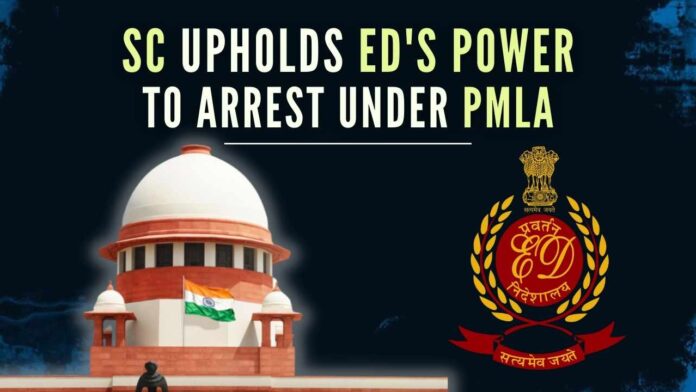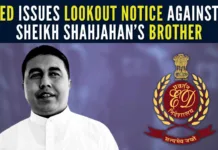
ED has powers to seize, search, and arrest: Top court
Strengthening the anti-money laundering probes, the Supreme Court on Wednesday upheld the Prevention of Money Laundering Act (PMLA) giving powers to the Enforcement Directorate (ED) for search, seizure, arrest, attach property, and burden of proof on the accused and stringent bail conditions. Observing that it is a common experience world over that money laundering can be a “threat” to the good functioning of a financial system, the apex court upheld the validity of certain provisions of the PMLA, some of which were contested by over 240 petitioners.
Among the 240 petitioners, one of the main petitioner was Congress MP Karti Chidambaram, who is accused in two cases filed ED. Interestingly, stringent amendments in PMLA were passed by the UPA regime in 2012, when his father P Chidambaram was Finance Minister. Even Chidambaram was recently speaking against the PMLA, the very law emboldened by him in 2012. Leading lawyer Kapil Sibal who was law minister during this period was speaking against this law in courts since 2014 for his accused clients.
In an order that will cement the powers of the federal anti-money laundering agency, a bench headed by Justice A M Khanwilkar said authorities under the 2002 Act are “not police officers as such” and the Enforcement Case Information Report (ECIR) cannot be equated with an FIR under the Code of Criminal Procedure (CrPC).
The bench, also comprising Justices Dinesh Maheshwari and C T Ravikumar, said the supply of an ECIR copy in every case to the person concerned is not mandatory and it is enough if ED, at the time of arrest, discloses the grounds of such arrest. The petitioners in the case had challenged the ED’s power of not disclosing the contents of ECIR, contending it violated the fundamental rights of the accused. The bench said in view of the special mechanism envisaged by the 2002 Act, ECIR cannot be equated with an FIR.
“ECIR is an internal document of the ED and the fact that FIR in respect of scheduled offence has not been recorded does not come in the way of the authorities referred to in Section 48 to commence inquiry/ investigation for initiating ‘civil action’ of ‘provisional attachment’ of the property being proceeds of crime,” said the apex court in its 545-page judgment, empowering the ED.
The court was hearing a clutch of over 240 petitions filed by individuals and other entities from 2014, questioning various provisions of the PMLA, a law which the opposition has often claimed has been weaponized by the government to harass its political adversaries. The court said Section 45 of the PMLA, which deals with offenses to be cognizable and non-bailable and have twin conditions for bail, is reasonable and does not suffer from the vice of arbitrariness or unreasonableness.
The petitioners had also challenged the stringent bail conditions laid down by the law for the accused. Section 45 says when the public prosecutor opposes the bail plea of an accused, the court can grant relief only after it is satisfied that there are reasonable grounds to believe that the accused is not guilty of having committed such an offence and is unlikely to commit any offense if granted bail.
“The challenge to the constitutional validity of Section 19 (power to arrest) of the 2002 Act is also rejected. There are stringent safeguards provided in Section 19. The provision does not suffer from the vice of arbitrariness,” said the judgment. It also said Section 5 of the Act, which relates to the attachment of property involved in money laundering, is constitutionally valid. “It provides for a balancing arrangement to secure the interests of the person as also ensures that the proceeds of crime remain available to be dealt with in the manner provided by the 2002 Act,” the bench said.
Rajeshwar Singh, the former Joint Director of ED, who headed many high-profile corruption cases – Now BJP’s MLA from Uttar Pradesh made a series of Tweets on the Supreme Court’s Judgment. His tweet thread on the salient points of the judgment empowering the ED is published below:
In a landmark judgement today, the Hon SC, has upheld the powers of the @dir_ed under the PMLA. The law will now continue to pursue justice and ensure that the corrupt are jailed and the illegally acquired properties continue to be attached under the #PMLA.1/5 pic.twitter.com/NQcHflGHmd
— Rajeshwar Singh (@RajeshwarS73) July 27, 2022
A host of top opposition politicians including Congress leaders Sonia Gandhi, Rahul Gandhi, P Chidambaram, his son, and MP Karti Chidambaram, Shiv Sena’s Sanjay Raut, National Conference leader Farooq Abdullah, TMC MP and West Bengal Chief Minister Mamata Banerjee’s nephew Abhishek Banerjee and Delhi minister Satyendar Jain are among those under the ED’s lens for alleged money laundering.
PGurus is now on Telegram. Click here to join our channel and stay updated with all the latest news and views
For all the latest updates, download PGurus App.
- Subramanian Swamy approaches Supreme Court on Govt’s modification of 2G Scam Judgment to avoid auction of Satellite Spectrum - April 23, 2024
- Defence Minister Rajnath Singh visits Siachen. Reviews military preparedness - April 22, 2024
- Amit Shah’s shares in the Stock Market almost doubled in the past five years - April 21, 2024











The people under allegations are without exception rich, powerful and well qualified, they are no petty criminals from Juggi Zopdi. The crimes committed by them are well planned and disguised with the help and connivence of best of the brains from the legal and financial fields. Finding the trail of money through the maze of transactions through the layers of companies is very laborious and time consuming task given the confidentiality clauses in different jurisdictions. The talk of success rate has no relevance in such investigations. The tough provisions in the act have rattled the lot and will hopefully make them think twice before indulging in similar ventures, the collective fees paid by the litigants in courts and to the lawyers will prove the point.
Will the ED shows the balls to bring the culprits to justice or the the deep-state within ED scuttle the process?
Whose approval is required to reclaim the PoK ?